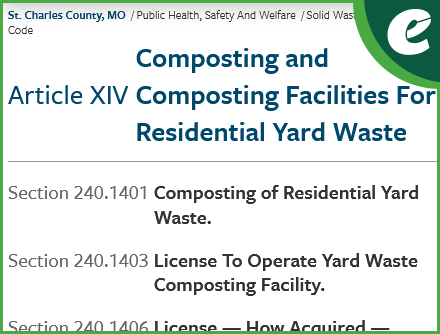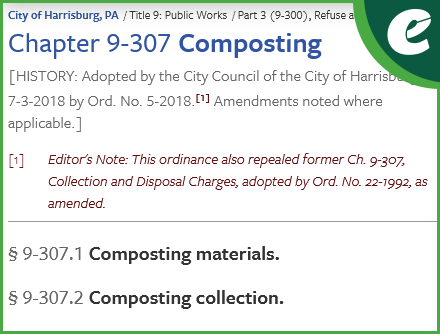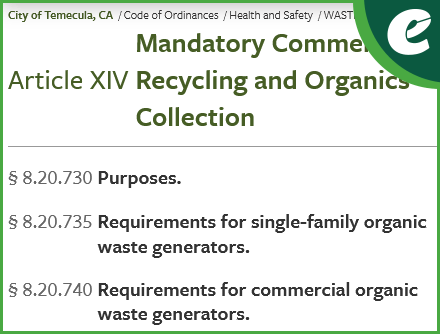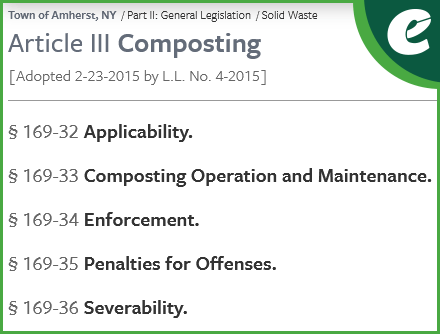Composting has typically been viewed as a tedious (and sometimes smelly) backyard garden project. Yet as landfills overflow with wasted food and a changing climate depletes fertile land where crops are grown, many communities are seeing the need and value of rolling out composting solutions on an even larger scale. A number of State and local governments are stepping in to help.
View sample community composting legislation >
Breaking it down
Composting is the natural process of breaking down food scraps, leaves, lawn clippings and other organic material into nutrient-rich matter. When returned to the earth, compost material can enrich the soil for plants and crops, help retain ground moisture and promote the reduction of harmful methane emissions into the atmosphere.
The environmental impacts of food waste
While it’s true that all organic waste eventually decomposes over time, the way it decomposes in a landfill—where it’s likely sitting in plastic garbage bags, surrounded by a host of non-organic matter—is quite different from how it decomposes in a compost pile.
During the first phase of landfill decomposition, the organic matter uses oxygen to break down—a process called aerobic decomposition . Within about a year, however, the supply of oxygen runs out—which is when the anaerobic decomposition (“without oxygen”) phase begins.
With anaerobic decomposition, bacteria break down the organic matter further—releasing methane gas as a by-product. Methane is a greenhouse gas which is considered to be significantly more powerful at accelerating global warming than carbon dioxide. Composting can, in many cases, eliminate the anerobic phase of decomposition altogether and with it the production of methane.
Scaling up
According to Institute for Local Self-Reliance (ILSR), there are thousands of collective composting operations in the U.S. but only about 300 of those are considered true community composting sites that make and use the enriched soil product locally.
Community composting describes local government programs, sometimes known as curbside collection, in which yard trimmings or food scraps are collected from homes and businesses or at drop-off sites. These programs may be managed, funded, and operated at the level of a town, city, county, solid waste district, or a combination, and may involve contracts with private compost haulers or producers.
Benefits of Community Composting
- Reduces landfills
- Saves on disposal costs, including transportation and disposal of waste
- Lowers production costs for farmers
- Creates healthier food and strengthens food systems
- Helps lower consumer food costs
- Creates more jobs
Holding their noses
Starting a community composting initiative is not without obstacles. Some of the bigger challenges include funding and financing, access to land and the lack of adequately sized equipment to handle a scaled-up operation. As in many communities, there are also vocal residents who view composting as a dirty, smelly process that would be a blight on the community and affect property values if expanded to a larger scale. Additionally, education is needed to lay out the benefits of community composting and to debunk common misinformation and myths surrounding it. Then there is the problem of municipalities simply lacking or lagging behind in regulations and zoning laws that set standards around food waste and where and how it can be disposed of properly. There are encouraging signs that is beginning to change through new proposals and legislation.
Taking action with community composting legislation
Effective policy at the state level has been critical for reducing food loss and waste, and state legislative bodies have been busy over the past few years introducing and passing policies tackling food loss and waste. Since January 2022, states have introduced or actively carried more than 70 bills on food loss and waste, 14 of which passed.
Early in 2022, Washington passed HB1799, a major food waste bill that sets forth a path for organics recycling for the next five years. Beginning in 2024, businesses that produce at least eight cubic yards of organic waste per week must arrange for on-site composting or organics collection. In 2025, the waste threshold decreases to include any business that produces over four cubic yards of organic waste per week. Businesses are encouraged to donate edible food, and the law sets a goal that at least 20% of edible food is recovered and donated by 2025.
To date, California likely has the most stringent regulations to combat organic waste:
- SB I383 makes it mandatory for cities, counties, and other jurisdictions to decrease their methane gas emissions by reducing the amount of organic waste they deposit in landfills by 75%. The first phase of the bill, which took effect in January 2023, requires jurisdictions to recover 30% of organic waste—a number that will increase to 65% on January 1, 2024, and 100% on January 1, 2025.
- SB 54, still in progress, will make it mandatory for all packaging sold in the state to be either recyclable or certified compostable by 2032. The Bill will also establish an extended producer responsibility program that would fund all reuse, recycling, and composting programs throughout the state.
- SB 1046, which takes effect in January 2025, will make it mandatory for all businesses to offer recyclable paper shopping bags or compostable bags instead of single-use plastic shopping bags.
Useful examples of community composting legislation from the eCode360® Library
If your community is interested in legislating or updating ordinances to regulate food waste and composting, here are some useful examples that can be found in our eCode360 Library:
Updating your municipal code is vitally important
Did you know you can set up a regular update schedule, so you don’t have to worry about compiling materials or taking up time and resources of your staff to do the updates yourself? As your municipality passes legislation, send it to General Code and we’ll take care of the rest. It’s just that simple!
For tips that will allow us to process your code updates most efficiently, click here.
Questions about updating your code?
Our Client Care team is available to explain the options and benefits of scheduled code updates or any other code-related questions you might have.
Sources:
- US EPA: Community Composting
- Institute for Local Self Reliance: What is Community Composting?
- ReFed: The State of Food Waste Legislation
- Grow Ensemble: The 15 Benefits of Composting for the Environment, the Economy, & Our Communities
- HouseGrail: 10 Composting Facts – Statistics and Data in 2023
- BioCycle: Community Composters Grow Into A Movement
- BioCycle: The Business of Community Composting
- NPR: Why not all cities are welcoming community composters
- EcoSafe: What Is Composting and Why Does It Matter
- NC State Extension: Community Backyard Composting Programs Can Reduce Waste and Save Money
- US Composting Council






